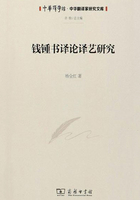
(五)选材不当之原因
上面几节文字涉及诗歌翻译选材败笔些许,至于其中原因,似不能一概而论,最为要者,一是译者态度不够严谨,二是译者在学识、眼光等方面力有不逮。举例来说,克拉拉·M. 凯德琳·扬(Clara M. Candlin Young)曾译有《中国的爱国诗——陆游的剑诗》(The Rapier of Lu,Patriot Poet of China),钱锺书发现,该书选文40篇,其中仅有9篇属于“爱国”题材,9篇中还有2篇与战争无甚关系(Of the upwards of forty poems in this book,only nine are patriotic,and two out of the number are certainly not very warlike. )。其实,陆游的诗作不少,要选到合乎要求者并非难事(There is a string of tempered steel to Lu You's lyre,and Mrs Young can easily find about a hundred martial songs in his complete poetic works.)。在钱锺书看来,扬氏在选材方面无疑难辞其咎,她估计连陆游的诗都没看完(I am afraid that she has not taken the trouble to read Lu You's complete works.)注397。更为要者,扬与历史上向西方译介中国古诗的一些传教士一样,对中国诗的特质根本就一无所知(Mrs. Young,like many Chinese apostles of the Higher Illiteracy who expound our old poetry to Westerners,does not even know the rudiments of its rules and principles.)注398上文曾谈及俞第德及其所译《白书诗书》和克洛岱尔重译《白玉诗书》部分篇什,针对他们俩在选材上的失手,钱锺书有分析如下:“故译诗者而不深解异国原文,或赁目于他人,或红纱笼己眼,势必如《淮南子·主术训》所谓:‘瞽师有以言白黑,无以知白黑’,无辨所译诗之原文是佳是恶。”注399再比如,英国学人李高洁曾出版《苏东坡作品选》,钱氏在为该书所写评论中也曾就译者之选材不当提出批评,指出《服胡麻赋》之类无甚价值之作根本不应与脍炙人口的《赤壁赋》《喜雨亭记》《黠鼠赋》等作品一并纳入(Most of Su's popular pieces such as “The Red Cliff”,“The Pavilion to Glad Rain”,“The Wily Rat”,etc. are translated together with some of his sorriest stuffs like ‘Medlar and Chrysanthemum’(《服胡麻赋》)which,in my opinion,should be ‘left severely alone’. ”)注400李高洁后来将《苏东坡作品选》修订再版为《苏东坡赋》,钱锺书在为新书作序时,对译者选材不当仍念念不忘。在钱氏看来,苏东坡的赋与其他文体作品在文风上有着天壤之别,主要体现于节奏(tempo)上。具体而言,苏氏其他文体的作品往往疾速(eminently rapid),而他的赋则舒缓有加(often slack down almost to the point of languidness as if he were caressing every word he speaks)。以此而观,《复改科赋》(On the Restoration of the Examination System)及《延和殿奏新乐府》(Modern Music in the Yen Ho Palace)等并非苏赋中的理想之作,不宜为了求全而将其一并选入。注401